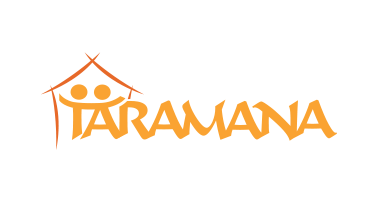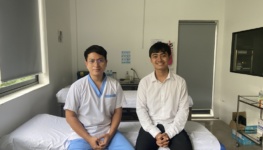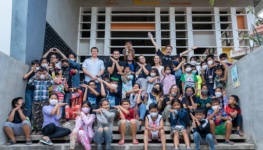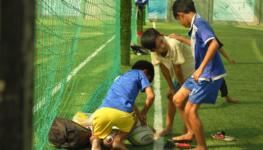“Taramana’s medical follow-up is essential.”
Interview conducted with Vuthny, an internal medicine physician and Visal, a nurse at Taramana.
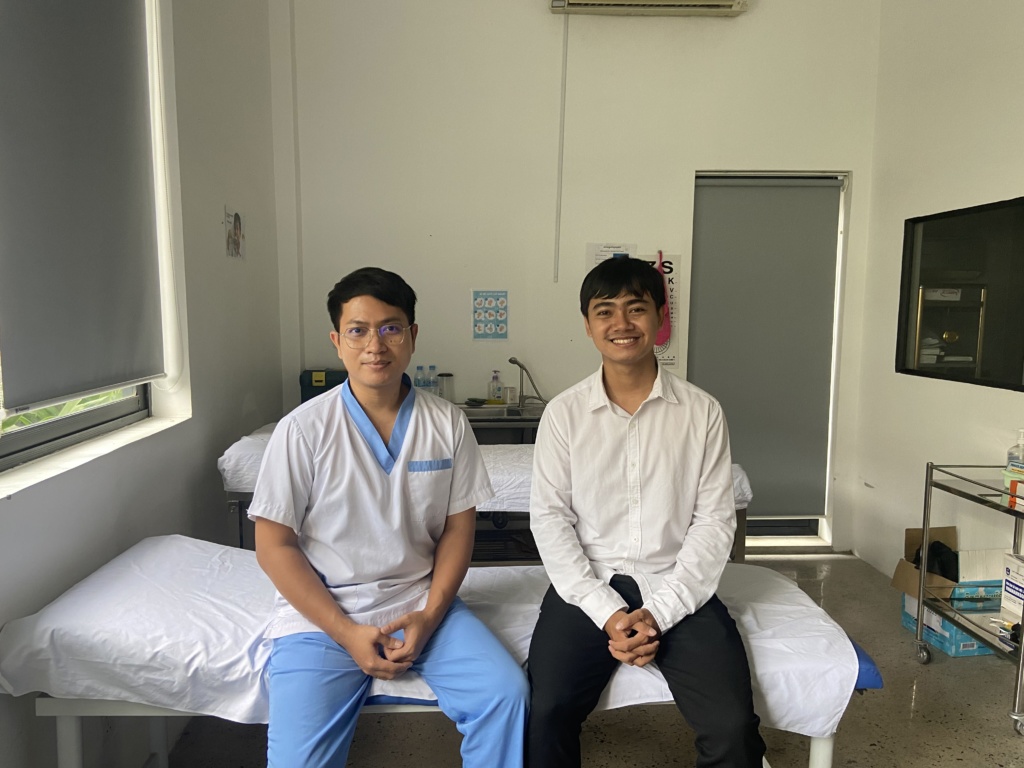
Since the creation of Taramana in 2005, even before starting any educational program, it was decided to focus on access to health care and nutrition. Under the impetus of Dr. Jocelyn Dordé, general practitioner and President-Founder of the NGO, a vaccination program (tetanus, poliomyelitis, MMR, hepatitis B) was quickly set up and opened to children and families.
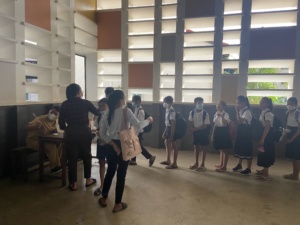
Very quickly, the families receive bags of rice every month and the children are assessed with an annual medical check-up, intestinal deworming, multivitamin cures and specific treatments if necessary. In 2008, a canteen was created offering a balanced menu to all children who come to study in the former Taramana center located in the heart of the slum.
In order to reduce the frequency of infectious diseases affecting the children, awareness courses have been developed and given by the medical team and the various nurses working at the center. Every month, the children assiduously follow sessions allowing them to learn more about body and dental hygiene, the dangers of alcohol and tobacco, drugs, the importance of wearing a helmet when riding a motorcycle, etc. This is all it takes for acute gastroenteritis, scabies and skin infections to become rarer, with the particularity that once they return home, the children are the ones who “sensitize” their parents and seniors. Also, the children at the Center receive multivitamins every two months and a deworming tablet every four months. The result: children who grow, gain weight and have better school results without any doubt.
Interview to follow with Vuthny, doctor at the Taramana Center and Visal, nurse, to give us their impressions and why health is so important at Taramana
1- Can you introduce yourself – explain your background ?
Visal: “Hello, my name is Visal, I am 34 years old and I have been working in Taramana for about 8 years. After finishing my nursing studies at the International University of Phnom Penh, I worked in hospitals and clinics and then I came to Taramana. When I am not working here, I am also a singer!”
Vuthny: “My name is Vuthny, I am 26 years old and I have been a student of Taramana since I was 12 years old. After 6 years of medical school, I am starting my 1st year of specialty in pediatrics. In addition to my studies, I gave French classes in Phnom Penh to Cambodians and additional math and Khmer classes to students of the NGO Enfants d’Asie. Along with Taramana, I am currently an intern at Kantha Bopha Hospital, for the past 3 months, for another 2 months.”
2- Can you explain your main missions at the Taramana infirmary ?
Visal: “I take care of the children and their families and sometimes I help with outside activities.
I order food for the canteen and perform first aid. If the children have medical problems or need to talk, they come to me.”
Vuthny: “I am there when the children of Taramana need and I try to educate them about different health topics, especially hygiene, to prevent them from having diseases in everyday life.
It makes me really happy to come to Taramana because I am a former student of the center and I owe a lot to it.”
3- Why is the medical follow-up of Taramana’s students important to you ?
Visal: “Taramana’s medical follow-up is essential because, for the most part, the children’s families do not have enough time or money to go to the hospital.”
Vuthny: “Health is important because it allows the children to study well, to learn more easily: physical health influences their mental abilities: if they are sick, they will not be able to go to school.
I help families who don’t have time to take care of their children medically.”
4- What is planned for the month of May, or in the coming months? For example, awareness of the dangers of drugs, tobacco, etc…
Visal: “Since the rainy season is starting right now, I am going to set up a presentation on the dangers of dengue and mosquitoes, by which dengue is transmitted. In previous years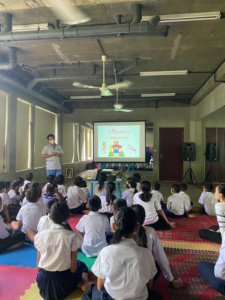 , I have sharedwith them several awarenesses: dangers of smoking, video games, the importance of hygiene in general, or prevention around animal bites, otherwise known as rabies.”
, I have sharedwith them several awarenesses: dangers of smoking, video games, the importance of hygiene in general, or prevention around animal bites, otherwise known as rabies.”
Vuthny: “As Visal mentioned, since the rainy season is coming earlier than expected this year, we will be putting on a presentation about dengue fever and its dangers. The objective is to sensitize the children by explaining to them the preventive means to put in place in order to avoid being bitten, such as wearing long clothes at night, or not staying in a dark and humid place where mosquitoes stagnate.
I’d also like to set up a presentation to educate them on the importance of outdoor safety, emphasizing wearing a helmet or being careful when crossing, for example.”
5- What is your vision of health in Cambodia, in general ?
Visal: “Health in general in Cambodia is neither good nor bad, but unfortunately, it is not the same for everyone because access is complicated.
For example, here in Boeng Salang, families prefer to have food rather than good health. 70% of children brush their teeth. Fortunately, most of the sensitizations we do at the Center are effective. In this case, the one on brushing teeth was effective: before, the children did not brush their teeth, but now they have the reflex to do it, thanks to the lunch at the canteen where they must necessarily go through the brushing of teeth stage.
The advantage at Taramana is the medical follow-up that we provide, even for the former students; all the former students of Taramana can come, including their families. My wish for the future is that Cambodians all have good health.”
Vuthny: “In my opinion, the Cambodian health system is still limited since we are in a developing country. Indeed, many poor people do not have enough means to get medical care easily. They are therefore unable to be treated and therefore get sick quickly. Some inequalities persist, for example civil servants can have access to free health care. On the other hand, I find that Cambodia allows a good quality of care in the hospital. My wish would be for everyone to have access to care for free, like in the hospital.”
7- How do NGOs play an important role in health care ?
Visal: “NGOs are essential in terms of access to health care for several reasons:
- Free access to health care
- Good quality of services and medicine
- However, I think there should be more medical staff in the NGOs, to bring help to families in need.”
Vuthny: “Taramana allows children and families to become aware of the importance of health, through different actions such as:
- Vaccination follow-up; I was vaccinated against hepatitis B, without Taramana this would not have been possible
- Dental hygiene: the children have taken good daily reflexes
- The contribution of health knowledge
If children are aware of the dangers, they can limit their rate of hospitalization and illness. Thanks to Taramana, children have access to education, which allows them to have access to a good job. This is especially true for me; thanks to Taramana, I will be able to become a doctor.”

8- What are, according to you, the positive and negative points of NGOs, at the medical level ?
Visal: The positive point is that we help people. The negative point is that there are not many means.”
Vuthny: “First of all, for me, there are more positives than negatives:
- the NGO can relieve the hospitals
- It helps children and their families
- It allows children to escape and be occupied
- It gives access to free medical care
- Access to a balanced meal with vegetables
- To benefit from a vaccination procedure
The main negative point is the lack of means and personnel. In Taramana, for example, someone should be present in the morning.”
9- What would be for you the 3 qualities to work in an NGO at the medical level ?
Visal:
- “Honesty
- To be committed to your work
- The ability to adapt since it is a special environment, it has nothing to do with a “normal” company or clinic Vuthny:
- “Being human
- Sociable
- Patient”
10- In your opinion, what could be changed in the Cambodian health system ?
Visal:
- “Make health more accessible by implementing more free medicines
- Create more hospitals and staff
- Make children more aware of the importance of hygiene etc…”
Vuthny: - Have access to hospital for free.
- Have more medical staff
- Make Cambodians more aware of the different dangers, as this would allow them to reduce care, etc.”
Orkun chraen Vuthny et Visal



